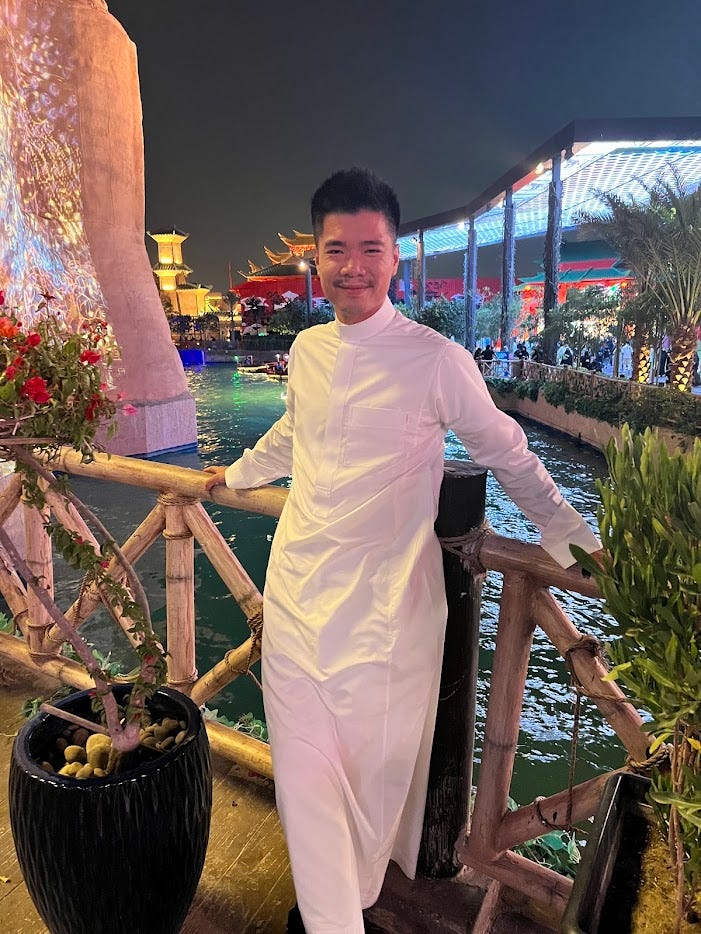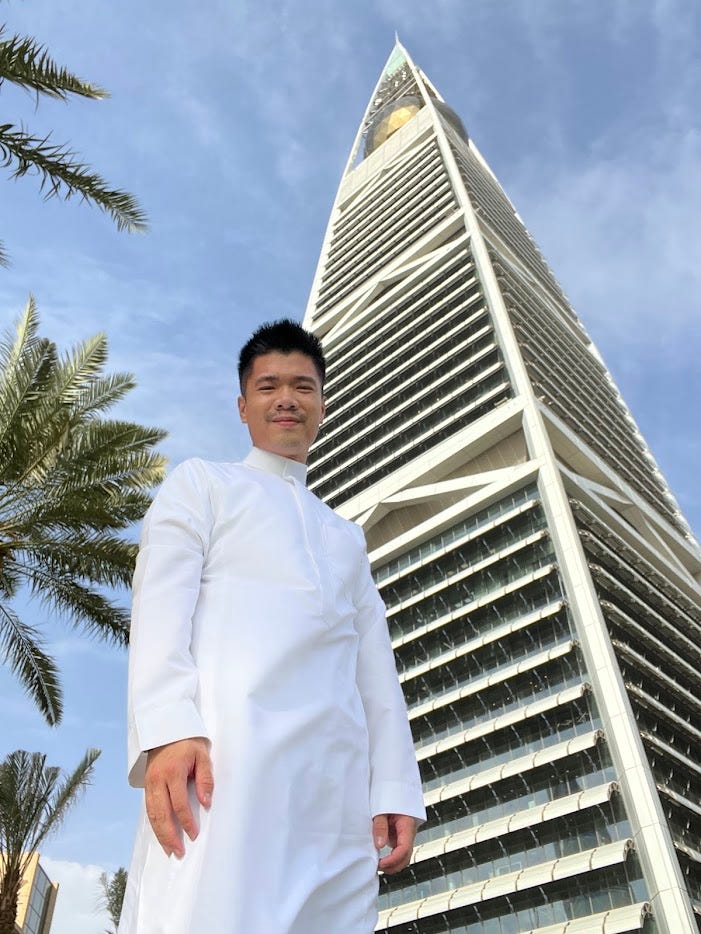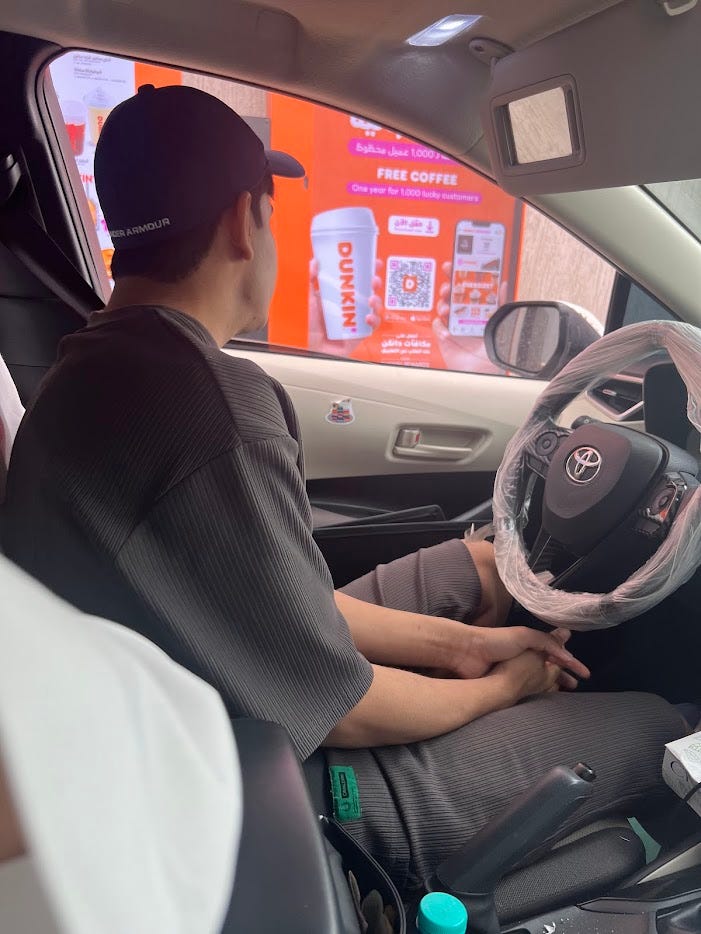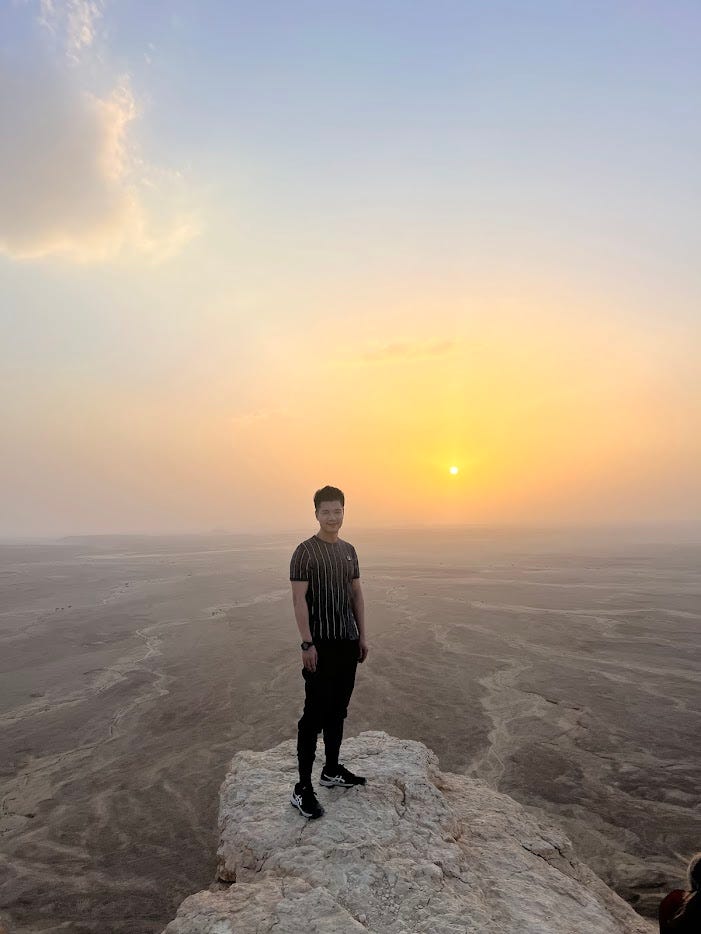18 Days in Saudi Arabia 🇸🇦 (and what I noticed as an American)
I'll be back
I recently came back from an 18-day work trip in Saudi Arabia. I was there to mentor two different hackathons, and I had two weeks in between events to explore Riyadh, the capital city.
It quickly turned into one of the most memorable trips I’ve ever had.
I’ve visited over 20 countries in my life, and Saudi Arabia was the most unique country I’ve ever visited.
Saudis fully embrace their culture through the traditional clothes they wear, their architecture, and food, which was markedly different from what I was used to in the US.
There were also very few tourists compared to travel destinations like Japan and Europe.
Saudi Arabia is still not seen as a vacation spot, so most Americans rely on media depictions to understand life in the Kingdom, which can be biased.
This was a once-in-a-lifetime opportunity to see things firsthand.

In this article, I’ll share the biggest differences I noticed between Saudi and American society, along with some photos I took while there.
I’ll cover my hackathon experiences in a separate article in the next few weeks.
Religion Permeates Saudi Lifestyle
The first difference I noticed in Saudi Arabia was how deeply religion is woven into everyday life, as the vast majority of Saudis are Muslim.
For example, people pray five times a day, and you can even hear the prayer calls from the mosques daily. Many Saudis also carry prayer mats with them to pray on the go.
Public buildings often have large prayer halls, and the bathrooms have shower areas for cleansing before prayer.
The ceiling of my hotel room even had a sign pointing in the direction of Mecca as you can see below!
Contrast this with the US where the First Amendment of the Constitution establishes separation of Church and State. No one religion dominates the US the way Islam does in the Kingdom.
Seeing the Saudi lifestyle made it clear to me that there is no one right way to live life, and it’s hard to impose one style of living on others. Religion works out for them, and a secular society works out for America.
I gained an appreciation for valuing spaces for prayer and religious expression over utility and productivity above all else.
Saudis Value Being Good Hosts
The second difference I noticed is that hospitality is valued highly in Saudi society.
I was struck by how generous people were to me during my stay.
A Saudi friend let me stay at his Airbnb for free for 2 weeks. He would drive long distances to pick me up and take me places, which happens more rarely here in the US.
So many Saudis paid for my meal that I felt kind of bad about it.
This contrasts with American norms where everything is more transactional - every dollar and favor is tracked carefully. Bills are split, and generosity like this is rarer.
Perhaps this is because hospitality is just valued more in their culture.
I also wonder if it’s related to the financial conditions of Saudis versus Americans. Saudis can afford to be more hospitable because of the social support systems in place.
A few Saudi friends mentioned that companies have quotas requiring a certain percentage of roles to be filled by Saudis, which guarantees citizens jobs.
They also have a system where people with the same last name are part of the same tribe, providing social support.
This contrasts with the US where there is less of a middle class, and financial pressures are larger.
63% of Americans can’t cover a $500 emergency, and 65% of Americans live paycheck to paycheck. So it’s not that Americans aren’t hospitable or generous; they literally can’t afford it.
The generosity that many Saudis showed me left a deep impact, and I find myself trying to be more generous here in the US.
Saudi Homogeneity vs. American Individualism
Lastly, Saudi society is more homogenous than American culture, where individualism is valued higher.
For example, most Saudis dress similarly. The men wear the white “thobes” with the head scarf, and the women wear hijabs or burkas as part of their religious worship. In the US, fashion attire is more diverse.

In Saudi society, you generally live with your family up until marriage. In fact, if you don’t live with them, one Saudi told me it’s seen as “shameful”. However in the US, you generally move out at 18.
Furthermore, the US is a country of immigrants, whereas Saudi Arabia is mostly….Saudis. So the US is a more diverse country.
Individualism helps fuel the entrepreneurship culture here in the US, but there is something to be said for the harmony of a population that acts as a cohesive society.
Conclusion
Part of the reason why I enjoyed this trip so much is that it allowed me to have diverse life experiences only accessible through entrepreneurship.
It allowed me to see the rapid growth of Saudi Arabia and notice opportunities I would’ve never known about.
Had I stayed at Netflix, a trip like this would’ve been very unlikely to happen.
I’m certain I’ll be back. Inshallah!
In the mean time, feel free to connect with me on LinkedIn or Twitter where I post daily content on AI and entrepeneurship.
You can also connect with me here on Instagram.
And, if you have any referrals for folks interested in building anything related to AI, let me know!
I offer a $1,000 referral bonus for every opportunity that closes (website link).
Thanks,
Michael










